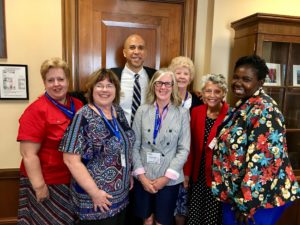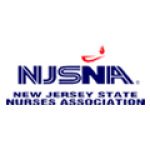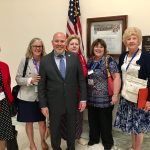N.J. Nurses Advocate on Capitol Hill for Opioid Addiction Treatment
NJSNA Also Supports Gun Violence Study, Safe Staffing

New Jersey State Nurses Association members met with Sen. Cory Booker (D) in his Capitol Hill office during their annual visit to Washington, DC on June 21, 2018 to advocate for nursing and patient care issues. NJSNA CEO Judith Schmidt, MSN, DHA (c) RN, CCRN, is on far left.
WASHINGTON, D.C.—June 21, 2018—Representatives from the New Jersey State Nurses Association (NJSNA) and the American Nurses Association (ANA) advocated today on Capitol Hill for several critical public-interest concerns, such as opioid addiction treatment, safe staffing, gun violence study funding and workforce funding.
Every year, an NJSNA-led coalition travels to Washington D.C. to fight for the profession of nursing and patient care in the Garden State.
“Issues that impact nurses, aren’t just ‘nursing’ issues. Everything we do affects patient care and clinical outcomes,” said Judith Schmidt, MSN, DHA (c) RN, CCRN and CEO of NJSNA. “Nurses are on the front lines of so many health care issues, such as opioid addiction, staffing, workforce development and dealing with the victims of gun violence.”
Opioid Crisis Continues in New Jersey
Maximizing the nation’s health care workforce is critical to turning the tide on the opioid addiction and overdose epidemic, which is impacting thousands in New Jersey. Advanced practice registered nurses (APRNs) are well-positioned to make a significant impact on many fronts, including expansion of access to a much-needed medication-assisted treatment (MAT). This prescribing authority is within all the APRNs respective scopes of practice.
Opioids have caused the death of 1,324 New Jersey residents from January 1 through June 11 this year, according to NJ Cares, a real-time dashboard of opioid information compiled by the New Jersey Attorney General. There were 3,987 Naloxone administrations, a drug to counteract an opioid overdose, through April 15 and 1,857,039 opioid prescriptions written from January 1 through June 1, 2018.
In all, 23,887 doses of Narcan, an emergency, life-saving drug that counteracts the effects of opioids, were administered by emergency officials to at least 17,964 individuals from 2015 to February 2018, according to a report in NJ.com.
The bill, H.R. 6, a combination of several opioid bills, that is up for a vote on June 22, would build on the successes of previous legislation by making MAT prescribing authority for nurse practitioners and physicians assistants permanent and extend the ability to prescribe to certified registered nurse anesthetists, clinical nurse specialists and registered nurse midwives.
“It is essential we expand this ability to additional advanced practice nurses, especially nurse midwives,” said Schmidt. “These practitioners are providing essential care in underserved areas and, more often than not, the only medical professional a woman is seeing. They can help combat the crisis in pregnant women and their children with the ability to treat them right away, which will help reduce healthcare costs in the long run.”
Even if federal laws change, there is an additional barrier to APN’s being able to prescribe in New Jersey, where APNs need a collaborator. A collaborator is a physician who has a financial relationship with the APN, this is known as joint protocol.
Safe Staffing for Nurse and Patient Safety Act
Staffing directly impacts patient care and outcomes. Bipartisan legislation recently introduced in both the House and Senate would require Medicare-participating hospitals to establish a committee, comprised of at least 55 percent direct care nurses, to create nurse staffing plans that are specific to each unit. This committee approach to creating nurse staffing plans recognizes that direct care nurses, working closely with managers, are best equipped to determine the staffing levels for their patients. Without appropriate RN staffing, patients risk longer hospital stays, increased infections, avoidable medication errors, falls, injuries, and even death.
The bill considers nurse experience, patient acuity and equipment. It also requires orientation to each hospital unit, procedures for complaints, penalties and whistleblower protection.
N.J. legislators recently introduced a bill to mandate ratios, which are a different approach to solving the staffing issues.
Gun Violence Claims 485 N.J. Lives in 2016
With a mass shooting that killed one and injured 22 at a Trenton art festival last weekend, NJSNA continued to urge elected officials for appropriate funding to allow the Centers for Disease Control and Prevention (CDC) to examine the causes and develop prevention strategies for gun violence.
Instructions accompanying President Donald Trump’s March spending bill give the CDC the authority to conduct research on the causes of gun violence, but no funds to support it, which leaves gun violence researchers pessimistic that any research will ever happen.
The CDC reports 485 deaths in NJ from firearms in 2016, the most recent data available.
Title VIII Nursing Workforce Development
These programs provide the largest source of federal funding for nursing education, offering financial support for nursing education programs, individual students and nurses.
These programs are invaluable to institutions that educate registered nurses for practice in rural and medically underserved communities. Title VIII programs bolster nursing education from entry-level preparation through graduate study.
This funding is critical because of the looming nursing and nursing faculty shortages as older nurses retire. New Jersey is starting to see nursing shortages, especially in surgical and labor and delivery nurses. There are not enough younger nurses qualified for the faculty positions, which require advanced degrees.
These shortages will become magnified as the population ages and puts more stress on the healthcare system.
###
About NJSNA
NJSNA, which was established in 1901, is a constituent member of the American Nurses Association. The New Jersey State Nurses Association (NJSNA) represents the interests of 125,000 registered nurses and advanced practice nurses as an advocate for the nursing profession. NJSNA’s lobbying arm continues to protect the nursing profession through legislative victories. Its nonprofit foundation, Institute for Nursing, helps nurses further their careers by providing continuing education, scholarships and research grants in addition to invaluable networking opportunities. For more information, nurses can visit www.njsna.org or contact NJSNA at njsna@njsna.org or (609) 883-5335.




